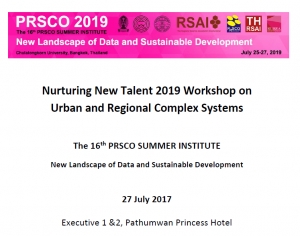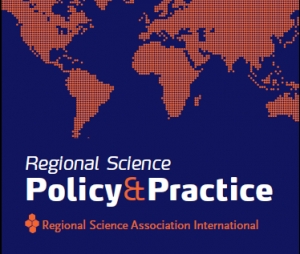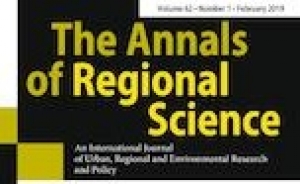Books
Elisabete Martins
Nominations for RSAI Councilor-at-large
Dear RSAI members,
By RSAI Constitution, nominations for Councilors-at-large “shall be made by the Council after solicitation of suggestions from the members of the Association”. At the end of 2019, the position held by Prof. Laurie Schintler (GMU) will expire; we therefore inform that the proposals for one councilor-at-large can be sent to This email address is being protected from spambots. You need JavaScript enabled to view it. within September 1, 2019. Candidatures will have to include a professional CV and a photo.
The election of one councilor-at-large for the period 2020-2022 will take place electronically by RSAI members during the month of September 2019.
Best regards,
Andrea Caragliu
RSAI Executive Director
Call for papers | NECTAR Cluster 6 (Accessibility) international workshop, Technical University of Munich, Germany, 12-13 December 2019
Please find enclosed the CfP for the Cluster 6 workshop on "The role Accessibility in times of Technological Innovation, (Re-)Urbanization and Climate Change".
This workshop will take place in Munich, 12-13 December 2019 at the Technical University of Munich, Germany.
RSPP Call for Paper | Special Issue on Understanding People's Views on Immigration
RSPP Call for Paper
Special Issue on Understanding People's Views on Immigration
Guest Editor: Dr. Bruce Newbold, McMaster University
Aims and Scope of the Special Edition
In an era when globalization and economic integration has facilitated movement from poor to rich countries, immigration has emerged as one of the most controversial political issues. International migration has long been associated with economic motivations and individual responses. While economic considerations continue to motivate a portion of international movements, war, civil strife, inequalities in health, well-being, and/or income across space drive migration. But the movement of individuals at the global scale has been increasingly challenged by the rise of populism. In part, the rise of populism has been driven by a sense amongst many in the developed world that they see less opportunity for themselves than in the past. These deep societal and labor market changes bring with them real fears and real costs which have manifested in the rise of new populist parties in countries, along with anti-immigrant policies and programs. Arguably, populism has shifted how much of the globe views immigration.
We invite submissions for a forthcoming special edition of Regional Science Policy and Practice on the topic of Understanding People’s Views on Immigration. Both empirical and theoretical papers will be considered. Please submit full papers via the RSPP online submission portal. The deadline for submission is December 15, 2019.
Submission instructions
Authors are encouraged to RSPP’s online submission process. All submissions will go through the journal’s standard peer-review process. For guidelines to prepare your manuscript and for manuscript submission please visit: https://rsaiconnect.onlinelibrary.wiley.com/journal/17577802
For questions regarding this special issue, please contact Dr. Bruce Newbold (This email address is being protected from spambots. You need JavaScript enabled to view it.)
Winners Martin Beckmann Annual Award for the best paper published in Papers in Regional Science in 2018
RSAI has the great pleasure to announce that the jury consisting of Janice Madden, Carlos Azzoni and Erik Verhoef chose the articles:
Tobias D. Ketterer and Andrés Rodríguez‐Pose, Institutions vs. ‘first-nature’ geography: What drives economic growth in Europe's regions?, published in Volume 97, Issue S1, March 2018, Pages S25-S62;
Motivation: Through an elegant scientific approach, the paper aims to investigate whether differences in institutional and ‘first nature’ geographical conditions have affected economic growth in Europe’s regions in the period 1995–2009. The analysis lies on a newly developed dataset including regional quality of government indicators and geographical characteristics, and arrives to the conclusion that regional institutional conditions – and, particularly, government effectiveness and the fight against corruption – play an important role in shaping regional economic growth prospects.
and
Wen Chen, Bart Los, Philip McCann, Raquel Ortega‐Argilés, Mark Thissen and Frank van Oort, The continental divide? Economic exposure to Brexit in regions and countries on both sides of The Channel, published in Volume97, Issue1, Special Issue: The trade, geography and regional implications of Brexit, March 2018, Pages 25-54,
Motivation: The paper tackles an important topic like Brexit, and studies the degree to which EU regions and countries are exposed to negative trade‐related consequences of Brexit. We develop an index of this exposure, which incorporates all effects due to geographically fragmented production processes within the UK, the EU and beyond. The paper demonstrates that UK regions are far more exposed than regions in other countries and that this imbalance may influence the outcomes of the negotiations between the UK and the EU.
as the winners of the Martin Beckmann Prize as the best paper published in Papers in Regional Science in 2018.
Call for applications | The Peter Nijkamp Research Encouragement Award
Call for applications
The Peter Nijkamp Research Encouragement Award
The award recognizes the outstanding potential of a mid-career researcher from a nation in the developing world in which there is a section of RSAI. Conditions for applications are:
Nominees will be judged in part on the evaluation of the paper and in part on an evaluation of the research track record and performance (CV).
The winner(s) will receive support, up to 750 Euro, to participate in a Supra-Regional meeting or in the World Congress, at which the paper will be presented.
The jury will comprise the Immediate Past-President of RSAI as Chair, an Editor of Papers in Regional Science, and two RSAI Fellows.
Deadline for the applications: November 30, 2019
(An eligible mid-career researcher from an eligible developing nation may submit a paper and their CV to the This email address is being protected from spambots. You need JavaScript enabled to view it. for consideration for the Award at any time up to the end of November of that year).
The ERSA Prize in Regional Science 2019 is unveiled
|
PRSCO 2019: Announcing Nurturing New Talent 2019 Workshops
Dear PRSCO 2019 Participants:
We would like to make an announcement about Nurturing New Talent 2019 workshops that will be held on July 27, 2019 at Pathumwan Princess Hotel. They are:
Workshop 1 (9:00-12:00): Remote Sensing to Support Research in Regional Science,
led by Associate Prof. Dr. Gang Chen (University of North Carolina at Charlotte)
Workshop 2 (13:00-17:00): Spatial Agent-Based Modeling,
led by Associate Prof. Dr. Yuri Mansury (Illinois Institute of Technology)
The workshop is funded by Nurturing New Talent 2019 of the RSAI, Chulalongkorn University, and Thailand Section of the RSAI. The workshop detail is attached and can be found at the conference website.
Presenters at the PRSCO 2019 can attend the workshop at no cost. However, due to limited space available, workshop participants are required to register for the workshop via the link below:
https://forms.gle/AtiTy5MpgfbU4MHs6
The registration is on a first come first serve basis. You will receive a confirmation email if you are successfully registered.
We are looking forward to welcoming you in Bangkok soon!
Sincerely,
PRSCO 2019 Secretariat
Postdoc positions in Xi’an Jiaotong University
Postdoc positions in Xi’an Jiaotong University
Professor Jinfeng DU from the School of Public Policy and Administration at Xi’an Jiaotong University is recruiting 4 postdoc to work on the National Key R&D Program of China on Nature-based solution for urban regeneration and other projects.
Online application website: http://careers.xjtu.edu.cn
Requirements from the supervisor:
- Research experience relates to the following fields: Nature-based solution and urban regeneration; land policy and land reform; poverty alleviation. Excellent research background in the followings fields could also be considered: urban and rural development; urban and regional analysis; environmental sciences; programming, software and big data; remote sensing and geographic information system; human geography; social cohesion; econometric etc.
- Good in written and spoken English and Chinese.
- Good at team work and could finish the research task on time.
- Support the recipients to apply for national scholarships or grants.
Additional requirements from the University and School:
- Not older than 35 year old.
- Graduated from world top 200 university or published at least one high-quality SSCI/SCI indexed paper as first author.
More information could be found from the following links:
http://hr.xjtu.edu.cn/info/1018/4891.htm#opennewwindow
http://hr.xjtu.edu.cn/info/1018/4890.htm
Please contact Professor Jinfeng DU if necessary.
Email: This email address is being protected from spambots. You need JavaScript enabled to view it.; This email address is being protected from spambots. You need JavaScript enabled to view it.
Phone: +86-187 2901 1366
RSPP Call for Paper | Special Issue on The underlying factors of (recent) regional voting patterns
The underlying factors of (recent) regional voting patterns
Explaining spatial patterns of voting behaviour is a very recent and rapidly growing field of research in regional science. Since the rise of more right-wing and/or protest voting, it has become apparent that these votes are not randomly spread over space. An interesting example is the spatial distribution of votes in favour of the Brexit. Most people who voted to leave the EU were located in the middle-east regions of England while the people who preferred to remain in the EU mostly lived in and around London. These voting patterns coincide with geographical patterns of education level; income level and dependence on the manufacturing sector (Becker et al., 2017). Recently, Andres Rodríguez-Pose connected this voting behaviour to a feeling of discontent that is increasing in certain regions and he labelled recent ballot outcomes across the EU as ‘The revenge of the places that don’t matter (2018).
In this special issue, the focus is on underlying factors of regional voting patterns. The territory contains many variables that can help us understand voters' voices about the single currency, migration, budgets, environment, education, health, taxes, life and peace. Can we link voting patterns to discontent, and if so, what is causing this feeling of discontent? Do voting patterns on various topics differ between regions and countries, between urban- and rural regions, and between regions that grow or are in decline? What about space-time patterns? We in particular welcome submissions that focus on causality.
Planning
- Expression of interest until September 15th 2019
- Full paper submission January 15th 2020
- Reviews February 2020
- Final paper submission May 2020
Editors: Prof. Eveline van Leeuwen (This email address is being protected from spambots. You need JavaScript enabled to view it.) & Dr. Solmaria Halleck-Vega (This email address is being protected from spambots. You need JavaScript enabled to view it.), Urban Economics group, Wageningen University
References
Becker, S. O., Fetzer, T., & Novy, D. (2017). Who voted for Brexit? A comprehensive district-level analysis. Economic Policy, 32(92), 601-650.
Rodríguez-Pose, A. (2018). The revenge of the places that don’t matter (and what to do about it). Cambridge Journal of Regions, Economy and Society, 11(1), 189-209.
The Annals of Regional Science, Vol. 62, Issue 3 - New Issue Alert
|
|||||
|
Important news |
|||||
|
|||||
|
In this issue |
|||||
|
|||||
|
|||||
|
|||||
|
|||||
|
|||||
|
|||||
|
|||||
|
|||||
|
|||||
|
|||||
|
|||||
|
|||||
|
|||||
|
|||||
|
|||||
|
|||||
|
|||||
|
|||||
|
|||||
|
|||||
|
About Us
The Regional Science Association International (RSAI), founded in 1954, is an international community of scholars interested in the regional impacts of national or global processes of economic and social change.

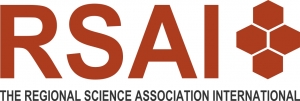
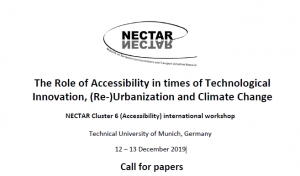
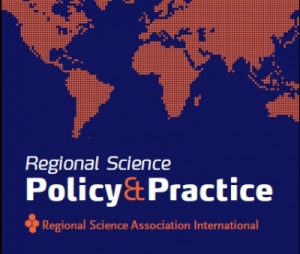
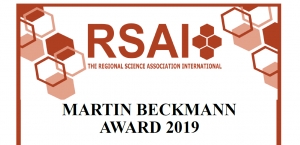
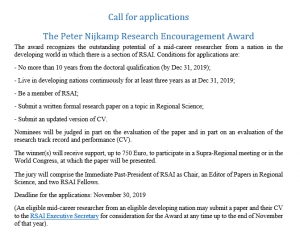
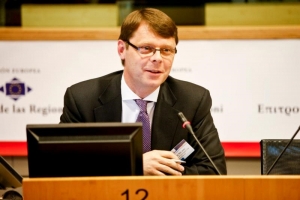

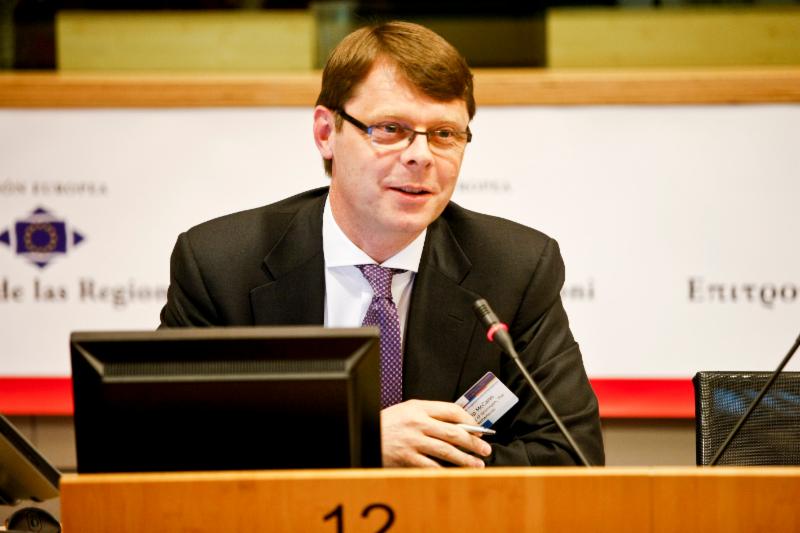 ERSA and the Jury of the ERSA Prize Committee are pleased to announce that this year’s prize recognizes
ERSA and the Jury of the ERSA Prize Committee are pleased to announce that this year’s prize recognizes 
